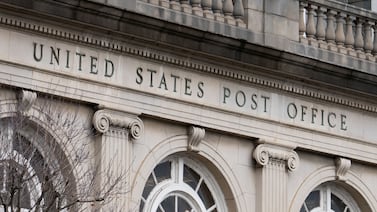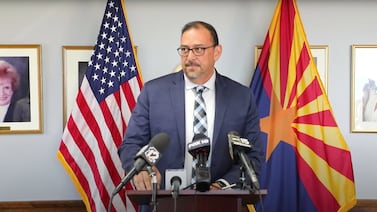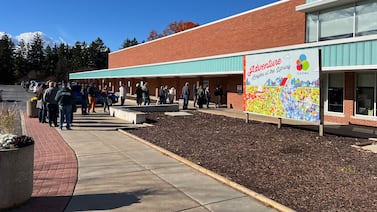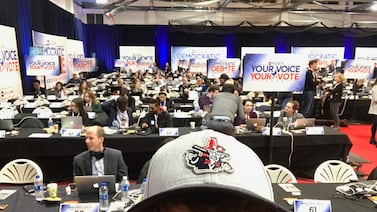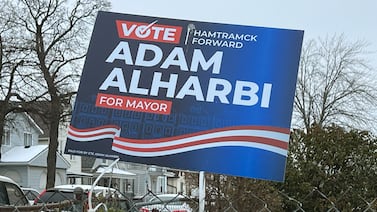A version of this post was originally distributed in Votebeat’s weekly newsletter. Sign up here.
Hi, y’all,
Hand-marked paper ballots. Have you heard about them?
Because it looks like folks are finding out they exist for the first time.
Very Serious People across the country — in Texas, Arizona, Kansas, Iowa, Utah, and elsewhere — are insisting counties stop using voting machines and tabulators, instead casting and counting all ballots by hand. It is, I’m told, a panacea to every problem facing the American election system, will ensure super easy voting and fast counting, and probably cure the common cold.
Obviously, all of that is incorrect (and we’ve written before about how the same folks insisting on hand counts haven’t bothered to reconcile that with the completely incompatible push for faster results). But it’s a mindset that seems to have gripped a large part of the country — the people who fundamentally distrust elections and technology. In pushing this, it’s clear proponents simply do not see the existence of disabled voters or their need for dignity in the voting process.
“All the handicapped people I know prefer paper and they’ve told me that,” Dan Rogers, chairman of the Potter County, Texas, Republican Party, told me late last year, saying that people he knew simply didn’t “trust” technology. And since then, a ton of people have gotten on board with this strange concept, which appears to be inspired as much by nostalgia for simpler times as faulty assumptions of increased security.
And some candidates for public office are pushing the false idea that your vote doesn’t count until you see someone count it. By hand.
“Your vote hasn’t counted for decades,” Republican nominee for Nevada secretary of state, Jim Marchant, said in a debate this year. “You haven’t elected anybody. The people that are in office have been selected. You haven’t had a choice.”
He’s taken his pitch for hand-counting ballots on the road, presenting the ideas to at least four counties in Nevada. In March, Nye County commissioners voted 5-0 to adopt hand counted ballots. Marchant is a member of a group of candidates who advocate such beliefs. They call themselves the “America First” coalition.
It’s a shortsighted and simplistic view of our voting system, where more than 90 percent of voters are already casting a paper ballot even if that paper ballot has been marked by a machine. About 70 percent of Americans cast ballots that are marked by hand. True hand counting only happens, the Washington Post finds, in a tiny percentage of precincts — mostly in small New England towns where votes are tabulated at the township level. American Samoa — with just over 16,000 registered voters and only three counting jurisdictions — counts entirely by hand. I don’t envy them, even with such a small number of registered voters.
Despite the facts showing otherwise, those advocating hand counting of ballots believe it to be common, tested, and foolproof. “We are proposing a proof-tested system, not a wild new idea that sounds good and that we merely hope works,” the group Secure Vote Utah writes.
As you, reader of this newsletter, must know by now, 100 percent hand-casted, hand-counted elections are a no-good, very bad idea that is absolutely not “proof-tested,” whatever that means in this case. There’s no sense in reinventing the wheel here. A whole bunch of articles and studies have already explained why.
Instead, I want to focus on one issue: that the movement for all hand-cast, hand-counted paper ballots erases the people who — because of physical disabilities, intellectual differences, or a host of other challenges — find it difficult or impossible to cast a paper ballot by hand. The disability community has, for decades, attempted to make its voice heard in election circles, and the rise of fervent advocacy of paper ballots shows how much work we all must do to ensure that happens.
Ballot marking devices with accessibility features allow individuals who cannot hand-mark a ballot to vote without help, in a truly anonymous fashion. Conspiracy theories around the security of these machines not only decrease confidence in the system as a whole, but make it impossible for these individuals to participate fully and equitably in democracy.
I routinely encounter people who respond to this by saying, “Fine, we’ll keep BMDs for them, then. Everyone else should hand-mark their ballots.” “Them” is telling here: These are voters, just the same, who shouldn’t be shuttled to a little-used machine the poll worker has not been trained to use because they are unable to participate in the same way as other voters. The ballots used by these machines would look far different than other ballots cast in the same precinct, eliminating the ability of these votes to remain truly anonymous.
Anyone who says differently is simply incorrect.
Casting an anonymous ballot — which requires a voter to be alone, in a booth, making their selections independently and without assistance — should not be a privilege for the abled. It should be the norm for everyone.
Back Then
While most associate the Voting Rights Act of 1965 with making voting more inclusive for voters of different races, it also contained provisions protecting the rights of disabled people. This was the first federal law that established that a voter with disabilities could receive assistance from a person of their choice. Subsequent laws refined and expanded the rights owed to these voters. Voting Accessibility for the Elderly and Handicapped Act of 1984 established a requirement that polling locations be accessible to those with disabilities. If they could not be made accessible, voters had to be provided with another means of voting on Election Day. The National Voter Registration Act of 1993, known as the “Motor Voter” law, was the first to require that public-assistance offices that primarily serve people with disabilities must provide opportunities for voter registration. The Help America Vote Act of 2002 required that every polling location have at least one accessible voting system for people with disabilities, and made clear that the voting option provided to such voters must not differ in terms of opportunities for participation or expectation of privacy.
New From Votebeat
As the midterms approach, the Michigan secretary of state’s office has found itself repeatedly defending the state’s election system against local clerks, a handful of whom allowed unauthorized access to their tabulators last year. Experts say the clearest vulnerability facing Michigan are such insider threats, which the secretary of state has little ability to proactively prevent, and at least one clerk is continuing to make false claims about the state’s voting machines. Oralandar Brand-Williams reports for Votebeat Michigan on the ways in which the state is trying to ensure security of its election equipment.
In the weeks leading up to August’s primary election, ballot drop boxes were getting a bad rap on the right. But despite all the rhetoric, plenty of Republicans across the state still used both mail ballots and drop boxes. A Votebeat analysis of data provided by multiple counties shows ballot drop boxes remain a popular voting option for all Arizonans, including in Republican-dominated areas, Rachel Leingang reports for Votebeat Arizona.
About a dozen activists demanding responses to conspiracy theories about election integrity this week disrupted what is typically an uneventful public testing of voting machines ahead of an election in Hays County, Natalia Contreras reports for Votebeat Texas.
Despite months of rancor in Tarrant County over the viability of voting machines and the accuracy of ballot counting, a test held Friday allowing members of the public to test the system themselves was sparsely attended. Tarrant County Elections Administrator Heider Garcia held Friday’s public test to address the concern that county-run testing would reach a predetermined conclusion. He hoped that allowing people to test the machines themselves would allow them to trust the results. The lack of participation was disappointing for Garcia, who has been attempting to address the concerns of these critics for months. Read the joint coverage from Fort Worth Reports and Votebeat Texas.
In Other Voting News
- Virginia Thomas, a conservative activist who lobbied state lawmakers to overturn the results of the 2020 election, has agreed to an interview with the House panel investigating the attack on the U.S. Capitol on Jan. 6, 2021. The committee is interested in communications between Thomas, the wife of Supreme Court Justice Clarence Thomas, and lawyer John Eastman, who promoted the discredited theory that Vice President Mike Pence could block certification of the 2020 election.
- In a partisan vote last week, the U.S. House endorsed legislation to overhaul the Electoral Count Act, century-old legislation which supporters of President Donald Trump attempted to exploit to stop certification of the 2020 election. Only nine Republicans supported the measure. The U.S. Senate is considering its own version of legislation to do the same thing, and the two versions would have to be reconciled. Both versions of the legislation would make clear that the role of the vice president in the certification of elections is purely ministerial.
- Michigan lawmakers and the governor’s office are negotiating over allowing some preprocessing of mail ballots, potentially in time for November’s election, Michigan Live reports. The state is one of 12 that doesn’t permit election officials to process mail ballots before Election Day, slowing election results.
- The Montana Supreme Court has reinstated a block on state laws passed last year that would end same-day registration and place new restrictions on the forms of ID that can be used to vote in the state, Montana Public Radio reports. Tribes, Native American advocacy groups, and youth advocacy groups had sued to block the new laws, arguing they disproportionately burdened tribal and young voters.
- NPR talked to veterans of the civil rights movement about the similarities they see with today. “The notion that in 2020s we would still be fighting over voting rights just didn’t really occur to me,” said one. “But here we are.”


